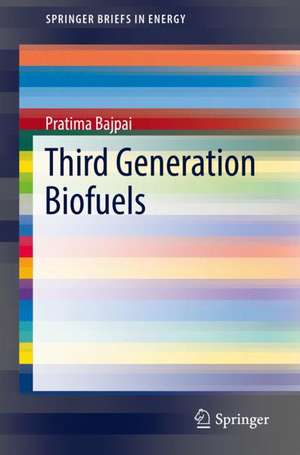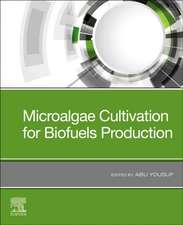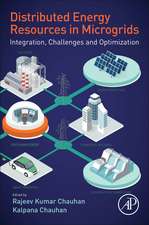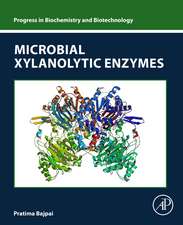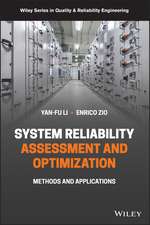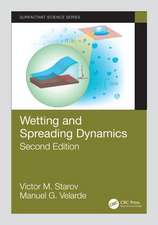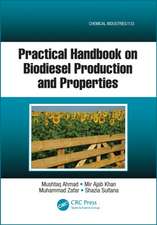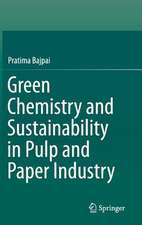Third Generation Biofuels: SpringerBriefs in Energy
Autor Pratima Bajpaien Limba Engleză Paperback – 16 oct 2018
Although biofuel processes hold great potential to provide a carbon-neutral route to fuel production, first-generation production systems are characterized by considerable economic and environmental limitations. The advent of second-generation biofuels is intended to produce fuels from lignocellulosic biomass, the woody part of plants that does not compete with food production. However, converting woody biomass into fermentable sugars requires costly technologies. Therefore, third-generation biofuelsfrom microalgae are considered to be a viable alternative energy resource, free from the major drawbacks associated with first and second-generation biofuels. This book examines the background of third-generation biofuel production; the advantages of algae over traditional biofuel crops; algal biomass production; algae harvesting and drying methods; production of biofuel from microalgae; and future prospects.
Din seria SpringerBriefs in Energy
-
 Preț: 345.89 lei
Preț: 345.89 lei -
 Preț: 345.89 lei
Preț: 345.89 lei -
 Preț: 376.04 lei
Preț: 376.04 lei -
 Preț: 377.35 lei
Preț: 377.35 lei -
 Preț: 476.42 lei
Preț: 476.42 lei -
 Preț: 343.36 lei
Preț: 343.36 lei -
 Preț: 374.85 lei
Preț: 374.85 lei -
 Preț: 477.72 lei
Preț: 477.72 lei -
 Preț: 176.35 lei
Preț: 176.35 lei -
 Preț: 380.07 lei
Preț: 380.07 lei -
 Preț: 376.22 lei
Preț: 376.22 lei -
 Preț: 377.95 lei
Preț: 377.95 lei -
 Preț: 376.43 lei
Preț: 376.43 lei -
 Preț: 377.73 lei
Preț: 377.73 lei -
 Preț: 343.00 lei
Preț: 343.00 lei -
 Preț: 377.35 lei
Preț: 377.35 lei -
 Preț: 377.95 lei
Preț: 377.95 lei -
 Preț: 444.35 lei
Preț: 444.35 lei -
 Preț: 348.83 lei
Preț: 348.83 lei -
 Preț: 412.30 lei
Preț: 412.30 lei -
 Preț: 377.73 lei
Preț: 377.73 lei -
 Preț: 375.62 lei
Preț: 375.62 lei -
 Preț: 380.07 lei
Preț: 380.07 lei -
 Preț: 376.80 lei
Preț: 376.80 lei -
 Preț: 376.22 lei
Preț: 376.22 lei -
 Preț: 479.67 lei
Preț: 479.67 lei - 15%
 Preț: 463.85 lei
Preț: 463.85 lei -
 Preț: 476.79 lei
Preț: 476.79 lei -
 Preț: 375.23 lei
Preț: 375.23 lei -
 Preț: 379.09 lei
Preț: 379.09 lei -
 Preț: 376.22 lei
Preț: 376.22 lei -
 Preț: 409.43 lei
Preț: 409.43 lei - 15%
 Preț: 462.38 lei
Preț: 462.38 lei -
 Preț: 414.21 lei
Preț: 414.21 lei -
 Preț: 375.62 lei
Preț: 375.62 lei -
 Preț: 374.30 lei
Preț: 374.30 lei -
 Preț: 376.22 lei
Preț: 376.22 lei -
 Preț: 478.71 lei
Preț: 478.71 lei -
 Preț: 381.71 lei
Preț: 381.71 lei -
 Preț: 379.09 lei
Preț: 379.09 lei -
 Preț: 375.62 lei
Preț: 375.62 lei - 15%
 Preț: 463.35 lei
Preț: 463.35 lei -
 Preț: 376.80 lei
Preț: 376.80 lei -
 Preț: 374.46 lei
Preț: 374.46 lei -
 Preț: 477.56 lei
Preț: 477.56 lei -
 Preț: 379.48 lei
Preț: 379.48 lei -
 Preț: 374.30 lei
Preț: 374.30 lei -
 Preț: 479.47 lei
Preț: 479.47 lei -
 Preț: 378.12 lei
Preț: 378.12 lei
Preț: 376.59 lei
Nou
Puncte Express: 565
Preț estimativ în valută:
72.07€ • 74.78$ • 60.24£
72.07€ • 74.78$ • 60.24£
Carte tipărită la comandă
Livrare economică 17-31 martie
Preluare comenzi: 021 569.72.76
Specificații
ISBN-13: 9789811323775
ISBN-10: 9811323771
Pagini: 70
Ilustrații: XV, 76 p. 8 illus., 6 illus. in color.
Dimensiuni: 155 x 235 mm
Greutate: 0.15 kg
Ediția:1st ed. 2019
Editura: Springer Nature Singapore
Colecția Springer
Seria SpringerBriefs in Energy
Locul publicării:Singapore, Singapore
ISBN-10: 9811323771
Pagini: 70
Ilustrații: XV, 76 p. 8 illus., 6 illus. in color.
Dimensiuni: 155 x 235 mm
Greutate: 0.15 kg
Ediția:1st ed. 2019
Editura: Springer Nature Singapore
Colecția Springer
Seria SpringerBriefs in Energy
Locul publicării:Singapore, Singapore
Cuprins
Chapter 1. General background and Introduction.- Chapter 2. Fuel potential of third generation biofuels.- Chapter 3. Characteristics of microalgae.- Chapter 4. Cultivation of 3rd generation biofuel.- Chapter 5. Harvesting and drying of algal biomass.- Chapter 6. Extraction of oil from algal biomass.- Chapter 7. Production of biofuel from microalgae.- Chapter 8. Current trends and the future of the algae-based biofuels industry.
Notă biografică
Dr. Pratima Bajpai is currently working as a Consultant in the field of Paper and Pulp. She received her PhD from the National Sugar Institute, Kanpur, India. She has worked at the University of Saskatchewan (Canada), University of Western Ontario (Canada), and Thapar Center for Industrial Research and Development (India). She has also worked as a visiting professor at the University of Waterloo, Canada and visiting researcher at Kyushu University, Fukuoka, Japan. Dr. Bajpai’s main areas of expertise are industrial biotechnology, paper and pulp, and environmental biotechnology. A recognized expert in her field, she has more than 150 publications in international journals and conference proceedings to her credit. She has written several advanced-level technical books for leading global publishers, has contributed to a number of chapters in books and encyclopedias, and holds 11 patents.
Caracteristici
Provides a background to 3rd generation biofuel production; advantages of algae over traditional biofuel crops; algal biomass production; algae harvesting and drying methods; production of biofuel from microalgae and future prospects Emphasizes on microalgae which are able to produce 15–300 times more oil for biodiesel production than traditional crops on an area basis Includes information about agricultural residues, forest harvesting residues or wood processing waste such as leaves, straw or wood chips as well as the non-edible components of corn or sugarcane
